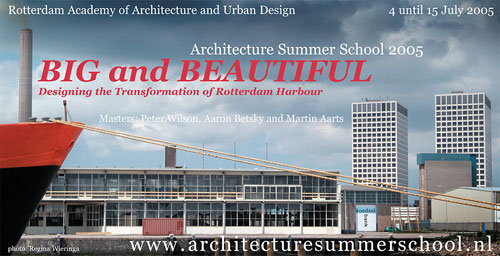
Masters
Peter Wilson Bolles+Wilson architects, Münster/Germany
Aaron Betsky Netherlands Architecture Institute, Rotterdam
Martin Aarts Municipal Urban Design Department of Rotterdam
All around the world harbour activities withdraw from urban areas due to globalization, the subsequent scale-leap and increasingly tight environmental legislations. As is the case in Rotterdam where harbour activities have been shifting towards the coast since the early twentieth century resulting in large-scale vacant areas along its riverbanks. Within the next 30 years a very large and diverse area, the so-called ‘Stadshavens’ will fall vacant. It contains a rich industrial heritage that to a large extent can form the background for a new urbanity with exceptional residential areas. Harbour activity stays en will be accompanied by other economic activities, housing and services.
This lasting presence of harbour functions is quite unique in Europe. Various harbour areas already have been given new functions. By doing so the river banks and various harbour basins have been more connected to the city. The renewal of ‘Stadshavens’ seems to be a logical continuation of this strategy, but every comparison stops right here. The Stadshavens area is much larger than all previous areas. Including the water surface, it encloses 1400 hectares, comparable to a medium-size city. Furthermore harbour activities remain a predominant factor in the area of Stadshavens. What can an area where harbour economy is connected to housing look like? How can the industrial heritage be re-used? How can the area become better accessible and what other urban functions are suitable for this desired hybrid use of harbour and city?
Programme
The two-week full time Architecture Summer School programme is designed to provide master students and young professionals in the fi eld of architecture, urban design, landscape architecture and related disciplines, an exercise in dealing with a unique yet realistic design problem on different scale levels as well as an introduction to a substantial harbour transformation assignment for Rotterdam, one of the biggest harbours in the world today. The Summer School is divided up into three specifi c case studies within the broader assignment allowing participants to subscribe to a desirable scale level and topic.
Application and Registration
1 June is the official application deadline, but late applications will be considered. The total fee will be €800,–. This will include accommodation, lunches and dinners, field trips, necessary local transport and a weekend excursion. For more information please contact: Ewoud Netten (e.netten@hro.nl), Coordinator external activities www.architecturesummerschool.nl

